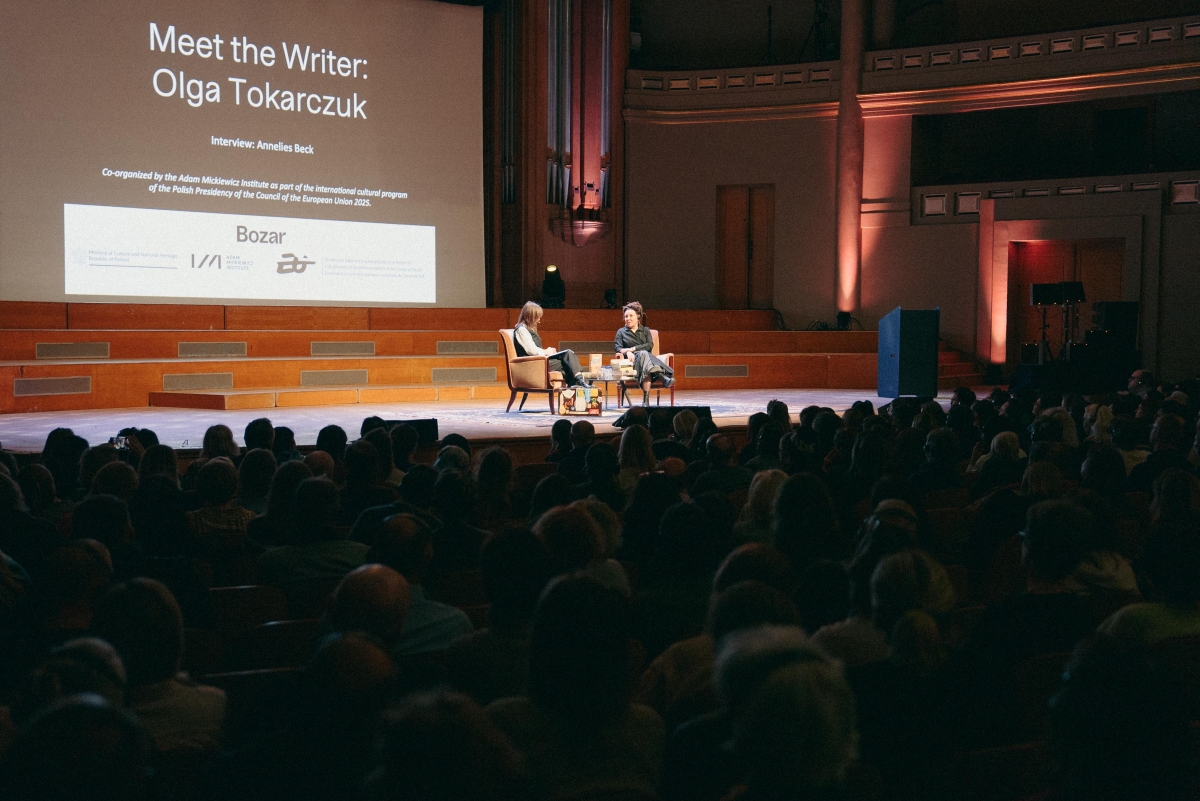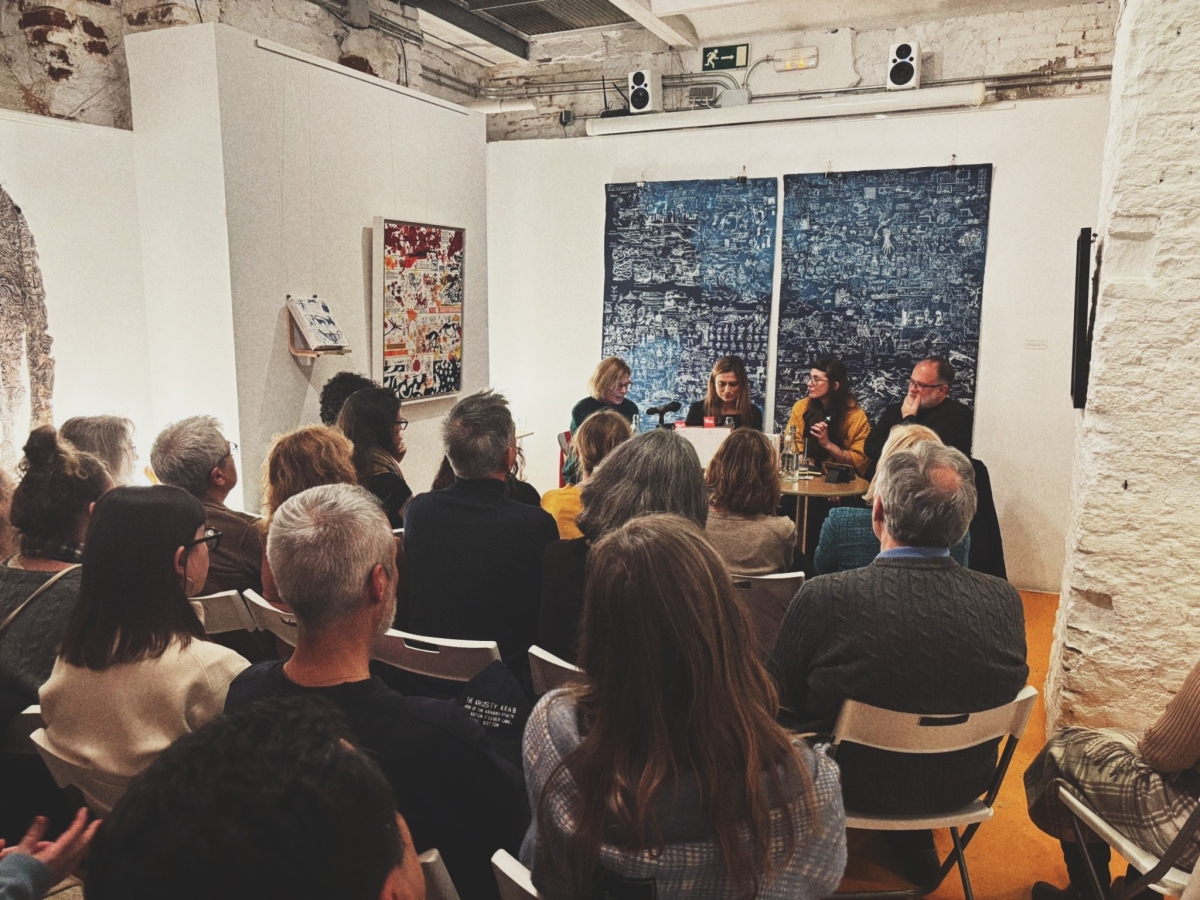
The work of the new generation and the power of translation represent two pillars on which the programme of literary events as part of the Polish Presidency of the EU Council rests. Meet-the-author sessions, literary festivals, book fairs, and illustration exhibitions provide space for weaving a tale on contemporary Polish literature and on what makes it so unique. The guiding principle behind the programme can be summarised by the words uttered during Olga Tokarczuk’s Nobel Prize laudation: “Polish literature shines a bright light”!
Literature between the worlds
Poland’s location at the borderline of different zones of influence naturally shapes a different view of the world, consistently explored by Polish literature. Throughout the centuries, this specifically different perception was subject to numerous tests and deconstructed multiple times. Today, Polish literature becomes more and more aware of its unique traits, at the same time remaining open to otherness, thus constructing itself in the constant in-betweenness. It stands out with its sensitivity to the intermingling worlds: East and West, people and nature, past and future, tradition and modernity. Themes dealing with mutual understanding and the idea of solidarity will be explored during literary events scheduled in different parts of Europe.
Meetings with Polish literature – discussions, festivals, fairs
A series of international meet-the-author sessions began with a January visit of Małgorzata Lebda in Barcelona and Madrid, focusing on the translation of her novel “Insatiable” into Spanish. One of the key events as part of the programme was a February meeting with Olga Tokarczuk at Bozar - Centre for Fine Arts in Brussels, where Annelies Beck talked with the Nobel Prize laureate about her recent novel “The Empusium”. At Literaturforum in Berlin, Mikołaj Łoziński, author of the acclaimed “Stramer” novel, talked with Maxim Leo about family memory and identity.
In March, the Book Fair in Leipzig will host, among others, Urszula Honek and Tomasz Różycki, while during the Paris Book Fair Polish authors will present their recent works translated into French. Olga Tokarczuk will visit Prague to grace the local Book Fair with her presence. The April Book Fair in Georgia will offer visitors another opportunity to broaden literary horizons: apart from meet-the-author sessions, a Polish-Georgian translation seminar will take place, hosting Jacek Dehnel, Krystyna Dąbrowska, and other poets-translators.
Literary guests at meetings in Spain will include Witold Szabłowski and Małgorzata Nocuń – representatives of the non-fiction genre that has long enjoyed unwaning popularity among readers in Poland and around the world. The literary programme as part of the Presidency will be crowned with a meeting with Dorota Masłowska during the Krokodil Festival in Belgrade in June, where the author will appear in a double role of a writer and DJ.

Meeting with Olga Tokarczuk at the Bozar - Centre for Fine Arts, photo by Marin Driguez
In the face of global challenges
A significant aspect of the programme is the introduction of a non-anthropocentric perspective to the broad humanistic discourse. In January, as part of the “Culture Train” project, participants had a chance to travel on a train with Michał Książek –an ecologist, proponent of biodiversity and author of the “Atlas of Holes and Cracks”. In March, Belgrade hosted the second edition of the Serbian School of Ecopoetics under the curatorial supervision of Prof. Julia Fiedorczuk. This event coincides with the International Poetry Day (21 March) and Poetry Festival in Belgrade, also co-organised by Julia Fiedorczuk. The aim of the project is not only to broaden the knowledge about ecology, but also to equip participants with competences and experiences translating into their everyday practice – both creative and professional.
Word and image
A broad presentation of Polish comics, which has gained ever greater recognition in recent years, took place during the 52nd edition of the Angoulême International Comics Festival in France. The booths showcased the most interesting recently published comic books, while authors had a chance to meet international public and representatives of publishing houses. The festival was accompanied by an exhibition of works by contemporary Polish comics authors, prepared by the Adam Mickiewicz Institute.
In addition, during the Book Fair in Bologna visitors will be able to view the exhibition of children’s book illustrations the Polish publishing houses are famous for. Numerous accompanying events, such as artistic residencies, workshops, and laboratories, will enable the audiences to immerse in the rich world of Polish illustrated books for children.
Translation is the future language of Europe
The Adam Mickiewicz Institute underlines the special role played by translators in promoting Polish literature on the international stage. New translations allow establishing relationships between people and make translators the true ambassadors of our culture. It is owing to them that users of different languages can understand one another better, as aptly put by Ryszard Kapuściński: “to translate” not only means to find the right words, but also “to explain”.
On the eve of assuming the Presidency of the EU Council by Poland, a special programme assisting international translators of Polish literature was launched. As part of it, in December 2024 a pilot study visits to Warsaw and Wroclaw took place. Subsequent initiatives strengthening the presence of Polish literature abroad are planned, with special emphasis placed on regions where it has been available only to a limited extent.

Meeting with Małgorzata Lebda at Llibreria la Central in Barcelona, photo by Klaudia Tenoudji, Instituto Polaco de Cultura
A detailed programme of events is available at: https://poland2025eu.culture.pl/.

